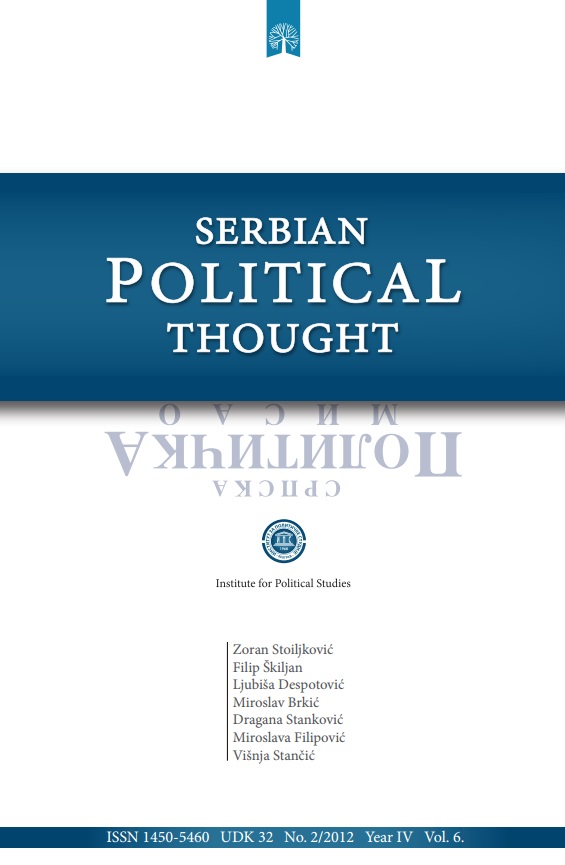Demokratie im Stillstand: die geminderte Einflusskraft der Europäischen Union auf Demokratisierungsprozesse
Democracy in a Stalemate: Decreased Leverage Potential of the European Union on Democratization Processes
Author(s): Ljubica ĐorđevićSubject(s): Government/Political systems, Transformation Period (1990 - 2010), EU-Approach / EU-Accession / EU-Development
Published by: Институт за политичке студије
Keywords: Democracy; Democratic Transition; European Union; EU Membership; EU Enlargement; European Neighbourhood Policy;
Summary/Abstract: The findings of the Freedom House about the democracy decline since 2006 as a global trend have provoked debate about the quality and vitality of democracy in the world. For some democracy is in decline, for other it is lacking progress, and some would argue that democracy is in transition. However it is obvious that democracy today is facing some challenges and is not quite in the best shape. The most significant challenge relates to its credibility as the best form of government, which is decreasing. The credibility of democracy is weakened by three factors: the lack of a solid ideological basis (in the context of the crisis of liberalism), the inability of democratic governments to meet the needs of the people, and the rise of alternative (pseudo- democratic) forms of government as a role model. The crisis of democracy affects its ability to widespread, as the lack of significant progress in democratization of autocracies or façade democracies in the past decade plausibly shows. The focus of this paper lies on the EU and its capacity to act as a democracy promoter in the context of democracy in crisis. One aspect of the problem is the capacity of the EU to intervene if a member state deviate from the democracy standards. Article 2 EUT oblige the member states to respect main principles of the democratic governance, and Article 7 EUT provides the EU with the mechanism to intervene if a member state violates values set out in Article 2. Although the membership in the EU is linked to the democratic form of government (Article 49 EUT and Article 2 EUT) the quality of democracy varies among the EU member states. Most significant examples are Bulgaria, Croatia, Hungary and Romania which all Freedom House rates as “semi- consolidated” democracies. But also in the EU stabile democracies one can identify some weaknesses such as low voter turnout, mistrust in the political elites, rise of extremist parties, etc. The EU has never activated the mechanism of Article 7 EUT but it has occasionally used its soft power to intervene if a member state violates democratic principles. However, the crisis of the EU has weakened its leverage and shifted its concerns on the very core of the EU and its functioning. For the EU it is important to provide consensus among the member states necessary for its functioning, and it is restrained to interfere with the quality of democracy in some of the member states. The other aspect of the problem is the capacity of the EU to act as a democracy promoter in the non- member states. The crisis of the EU has significantly reduced its interest and partly its capacity to stimulate or promote democratization in the non- member states. The leverage of the EU- Enlargement policy, as a central external factor in the democratization of the states in Central and East Europe, has significantly decreased due to the uncertainty of a new enlargement. A clear and foreseeable membership perspective, as the central instrument of the EU leverage, is nowadays uncertain, and the “membership- enthusiasm” both on side of the EU and of the candidate counties (i.e. Albania, Macedonia, Montenegro, Serbia, and Turkey) is not quit high. Even more, the EU focuses predominantly on the stability of the candidate counties and at the moment it shows less interest on the quality of democracy in these countries. The result is a bunch of countries which are lost in transition and permanently on the edge of the crisis. The European Neighborhood Policy (ENP) also indicates the limitations of the EU leverage without the membership perspective. The EU has not succeeded to position itself as a stabilizing external player and to push its eastern and southern neighbors towards democracy. The ENP focuses on 16 counties, which are almost all no democracies. Some of them are even failed states (Egypt, Libya, Syria and partly the Ukraine) and the EU has shown incapability to deal with the crises in these countries. However, it would be unfair to overcriticize the EU and to make it responsible for the failure or stalemate of democratization in specific states. The EU cannot execute democratization in (sovereign) states. The responsibility for the reforms and the democratization lies predominantly at the domestic players, and the EU can only promote and support the process. The main problem lies exactly in the fact that the EU shows disinterest and reservation regarding its role as a democracy promoter.
Journal: Serbian Political Thought
- Issue Year: 12/2015
- Issue No: 2
- Page Range: 5-32
- Page Count: 28
- Language: German

